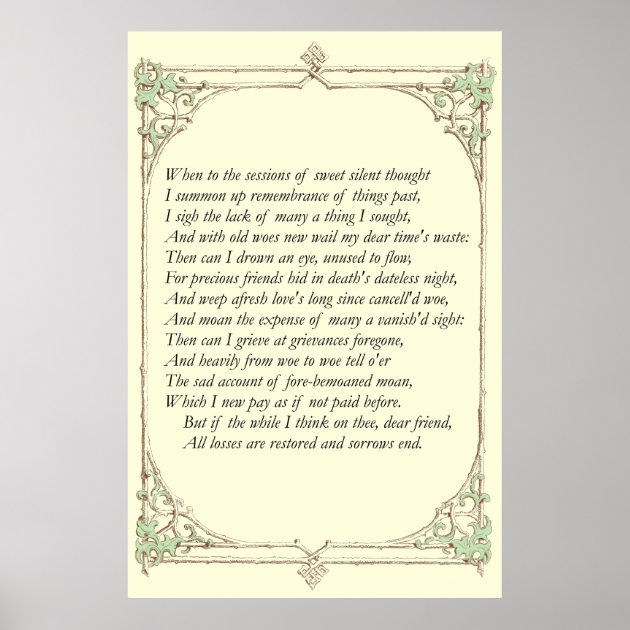

This pinnacle of the poet's plaintive state is beautifully conveyed through an artful use of repetition and internal rhyme. Meanwhile sonnet 30's closing couplet reiterates lines 9-14 of sonnet 29 in compact form, emphasizing that the fair lord is a necessity for the poet's emotional well-being: the fair lord is the only thing that can bring the poet happiness.

Whereas in sonnet 29 he quits his whining after the second quatrain, in sonnet 30 three full quatrains are devoted to the narrator's grief, suggesting that his dependence on the fair lord is increasing. The fair lord enters the scene only in the sonnet's closing couplet, where he is presented as a panacea for the poet's emotional distress.Ĭlosely mirroring the message of sonnet 29, here Shakespeare cleverly heightens the expression of his overwhelming anxiety by belaboring the theme of emotional dependence. The sonnet begins with the image of the poet drifting off into the "remembrance of things past" - painful memories, we soon learn, that the poet has already lamented but now must lament anew. Sonnet 30 is at the center of a sequence of sonnets dealing with the narrator's growing attachment to the fair lord and the narrator's paralyzing inability to function without him. "But if the while I think on thee, dear friend / All losses are restored and sorrows end."īut as soon as I think of you, my dear friend, all those wounds are healed, and my sorrows come to an end. The sad remembrance of things I have grieved over already, which I now grieve over anew as though I never did before. "The sad account of fore-bemoaned moan / Which I new pay as if not paid before." Then I can grieve over past griefs and recount each sadness with a heavy heart, "Then can I grieve at grievances foregone / And heavily from woe to woe tell o'er" "And weep afresh love's long since cancell'd woe / And moan the expense of many a vanish'd sight:"Īnd weep again over former loves that I put behind me long ago, and cry over the pain of many faded memories: Then I can cry, being unaccustomed to crying, over dear friends who have died, "Then can I drown an eye, unused to flow / For precious friends hid in death's dateless night," I regret that I did not achieve many things I tried to get, and with old regrets renewed I now grieve over having wasted my precious time:

"I sigh the lack of many a thing I sought / And with old woes new wail my dear time's waste:" When I am in a pensive state and recall my memories of past things, "When to the sessions of sweet silent thought / I summon up remembrance of things past,"


 0 kommentar(er)
0 kommentar(er)
